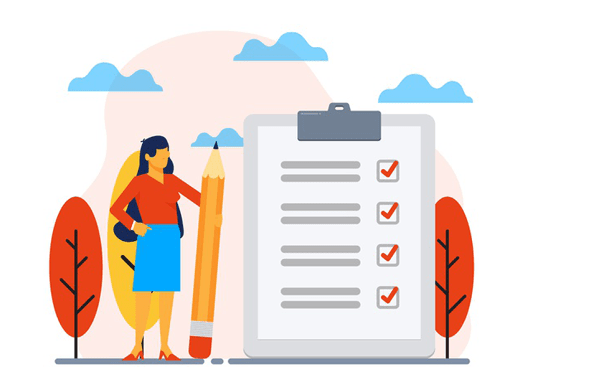How To Write Content For Your Website: A Beginner’s Guide
If you’re reading this, chances are you want to learn how to write content for your website. Whether you’re a business owner who wants to improve your website’s content or a freelance content writer who wants to write for websites, this guide is for you.
In this guide, we’ll cover the basics of writing effective website content. We’ll start with some tips on planning and structuring your content, then move on to the actual writing process.
By the end of this guide, you should have a good understanding of how to write content that will engage and convert your website’s visitors.
What Is Web Content?
Web content is the text, images, videos, and other information that you publish on your website. It can include anything from articles and blog posts to product descriptions and customer reviews. The goal of your web content is to attract visitors to your site and keep them engaged.
To create effective web content, you need to understand your audience and what they’re looking for. Once you know what type of content will appeal to them, you can start planning and writing your own articles, blog posts, or other pieces.
Keep in mind that your content should be well-written, accurate, and informative – it’s not enough to just stuff keywords into your text.
Search engines are getting smarter all the time, so you need to make sure that your content is high quality if you want it to rank well in search results.
If you’re not a experienced writer or don’t have time to create your own content, there are plenty of places where you can find pre-written articles and other types of web content.
Just make sure that you choose reputable sources and double-check the facts before publishing anything on your site.

The Different Types of Web Content
It seems like there are as many different types of web content as there are websites. So, how do you know which type of content is right for your website? Here’s a quick rundown of some of the most popular types of web content:
Articles: These are typically informative pieces that teach the reader about a particular subject. They can be either long-form (1000+ words) or short-form (500-700 words).
Blog posts: These are similar to articles, but they’re usually shorter and more informal in tone. They can be used to share opinions, stories, or even just updates on what’s going on with your company.
Product pages: If you have an ecommerce site, then you’ll need product pages for each item you sell. These should include high-quality photos, detailed descriptions, and customer reviews.
Landing pages: A landing page is a stand-alone page that’s designed to convert visitors into leads or customers. They often have a specific call-to-action (CTA), such as filling out a form or making a purchase.
Homepage: Your homepage is typically the first page people will see when they visit your site, so it’s important to make a good impression. Include a brief description of what your site is about, along with links to your most popular pages.
How to Write Web Content
Web content writing is a process of creating content for websites. The first step is to determine the purpose of the website and its target audience. Once you know the purpose and target audience, you can start creating content that is relevant and interesting to them.
There are a few things to keep in mind when writing web content:
Write for your target audience
Make sure that the content you write is relevant and interesting to your target audience. Don’t try to stuff keywords into your content just for the sake of it – this will only alienate your readers.
Assuming you know who your target audience is, writing for them is not much different than writing for any other audience. The key is to keep their needs and wants in mind as you develop your content.
Before you start writing, take some time to consider what your target audience is looking for. What information do they need?
What are they interested in? How can you help them? Once you have a good understanding of their needs, you can start developing your content.

Remember to keep your target audience in mind as you write. Write in a way that will appeal to them and address their needs.
Be clear and concise so they can easily understand your message. And don’t forget to proofread! You want to make sure your content is error-free before you publish it.
When you sit down to write web content, it is important to keep your target audience in mind. Write for the people who will be reading your content, not for yourself.
Consider what questions they might have and answer them in your content. Use language that they will understand and avoid jargon. Keep your sentences short and to the point.
Use keywords
When creating content for your website, it is important to use keywords that accurately reflect the topic of your page. This will help users find your content when they are searching for information on the web.
To choose the right keywords, think about what terms users would type into a search engine when looking for information on your topic. Then, include these keywords in your content in a way that flows naturally.
Don’t stuff your content with too many keywords, as this can result in penalties from search engines. Instead, focus on creating quality content that accurately reflects your keywords and helps users find the information they’re looking for.
There are a few things to keep in mind when using keywords in your web content. First, you should try to use keywords that are relevant to the topic of your website.
If your website is about car insurance, then you should use keywords related to car insurance, such as “car insurance,” “auto insurance,” or “insurance.”
Second, you should use keywords throughout your web content, including in the title, in the body, and in the tags and descriptions for your website.
Third, you should use keyword research tools to find out which keywords are being used most often by people who are searching for information on the internet. This will help you choose the best keywords to use in your web content.
Keep it fresh
nobody wants to read stale, outdated content. Make sure that your content is always up-to-date and relevant.
Make it easy to read – use short paragraphs and clear sentence structure. Breaking up your text with headlines and subheadings will also help make it more scannable for readers.
Use imagery – adding images, infographics or videos can help break up text and make your content more visually appealing. Just make sure that any visuals you use are relevant to your topic and add value to your article.
It is important to keep your web content fresh in order to keep your readers engaged. You can do this by regularly updating your content, adding new information, and keeping your writing style interesting.

One way to update your content is to add new sections or topics. This will keep your readers coming back for more information, and it will also help you attract new readers.
If you have a blog, you can also add new posts on a regular basis. This will give your readers something to look forward to, and it will also help you boost your search engine ranking.
Another way to keep your web content fresh is to revise and update existing information. This ensures that your readers always have the most accurate information, and it also helps you avoid repetition.
If you have an e-commerce site, it’s especially important to keep product descriptions and pricing up-to-date.
Finally, make sure that your writing style remains interesting and engaging. Boring writing will turn off readers quickly, so mix things up with different formats, such as lists or infographics. And don’t forget to proofread everything before you publish it!
Write simply
Most people who are reading content on the web are looking for quick and easy answers to their questions. They don’t want to wade through long, complicated paragraphs. So, it’s important to get your point across as quickly and clearly as possible.
Here are a few tips for writing simply:
- Use short sentences.
- Use common, everyday words.
- Be clear and concise.
- Avoid jargon.
In order to write web content that is effective, you need to keep your writing simple. This means using short, straightforward sentences and easy to understand language. You also want to avoid using jargon or technical terms that your audience may not be familiar with.
By keeping your writing simple, you will make it easier for your readers to understand what you are trying to say. This will help engage them with your content and keep them coming back for more.
Use headings
Headings are one of the most important elements of web content, as they help to break up the text and make it easier to read. When writing headings, keep them short and to the point, and make sure that they accurately reflect the content that follows. Also, be sure to use keywords in your headings, as this can help improve your website’s search engine ranking.
Headings are an important part of web content. They help to break up the text and make it easier to read. They also help search engines to understand the structure of your page.
If you use headings correctly, they can make a big difference to the usability of your website. Here are some tips on how to use headings in your web content:
– Use headings to break up your text. This will make it easier for people to read.
– Use different heading levels (H1, H2, H3 etc) to show the hierarchy of your content.
– Make sure your headings are descriptive and give an indication of what the section is about.
– Try to use keywords in your headings, as this will help with SEO.
– Don’t use too many headings on one page – keep things concise.
Tips for Writing Effective Web Content
When it comes to writing content for your website, there are a few things you should keep in mind if you want it to be effective.
First, make sure that your content is well-written and free of any errors. It should also be interesting and relevant to your target audience.
Another important thing to consider is search engine optimization (SEO). This is how you can ensure that your content will be seen by as many people as possible. Use keywords throughout your text so that search engines can easily find and index it.
Finally, don’t forget to promote your content once it’s published. Share it on social media, send out an email newsletter, or post it in forums and online communities related to your topic. The more people who see it, the more likely they are to visit your website.
Conclusion
If you’re just getting started with writing content for your website, this guide should give you a good foundation to work from.
Remember to keep your audience in mind, and write in a way that is both engaging and informative.
With a little practice, you’ll be able to produce content that will help your website rank higher in search engines and attract more visitors.
By following these tips, you can make sure that your web content is more likely to be found by people who are searching for information on the internet.
- 8 Tips To Being A Successful Freelance Writer
- 7 Reasons Why You Should Hire A Content Writer
- Writing tips for beginners: A Step-by-Step Guide for bloggers
- 10 Reasons why Content Writing is Important for your Business
Read more SEO articles and boost your knowledge. Follow me on Twitter, LinkedIn, Facebook, Instagram
